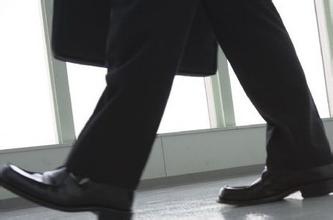(单词翻译:单击)
If you saw a man walk into a bar with a John Wayne swagger, you might assume that he's a confident, tough kind of guy.
如果你看见一个像约翰·韦恩一样昂首阔步地走进一个酒吧,你可能会认为他是个自信、坚韧的家伙。
Or perhaps you'd have less polite thoughts. Either way, you probably wouldn't be able to help yourself from jumping to conclusions about his personality based on his gait.
或者,你还会对他有非分之想。或者,你可能会情不自禁的以他的步态来判断他的性格。
Psychologists have been studying these assumptions for well over three quarters of a century, and their findings suggest that most of us do tend to make very similar interpretations of other people's personalities based on their walking style. But how accurate are these assumptions?
心理学家对这些假设已经研究了超过了四分之三个世纪了,他们的研究结果表明,我们大多数人倾向于根据别人走路的风格,对其性格作出非常相似的假设。但是这些假设有多准确呢?

US psychologists in the late 1980s found that there are broadly two kinds of walk, which could be characterised by either a more youthful or older style of movement.
上世纪80年代末,美国心理学家发现了两种主要的走路姿态,可以依靠其将人划分为年轻风格或年长风格。
Furthermore, the observers assumed that people who walked with a younger style were happier and more powerful. But the study didn't address the question of whether these assumptions are accurate.
而且,观察者认为,走年轻风格步态的人更快乐,更强大。但这项研究并没有解决这些猜测是否准确的问题。
For that, we must turn to a British and Swiss study published just a few years ago, which compared people's ratings of their own personalities with the assumptions other people made about them based on point-light displays of their walks.
为此,我们必须求助于几年前英国和瑞士的一份研究,这项研究对比了参与者对自身性格的评估以及他人根据光点运动轨迹对其性格的描述。
Their results suggested again that there are two main walking styles, although this study described them in slightly different terms: the first was said to be an expansive, loose style, which observers saw as a mark of adventurousness, extraversion, trustworthiness and warmth; the other was a slow, relaxed style, which observers interpreted as a sign of emotional stability.
他们的研究结果再次表明,主要存在两种走路风格,虽然描述术语稍有不同:第一种是潇洒放松的风格,观察者认为这是富于探险的、外向的、值得信赖的和温暖的;另一种是缓慢轻松的风格,观察者认为这是情绪稳定的标志。
But crucially, the observers' judgments were wrong – these two different walking styles were not actually correlated with these traits, at least not based on the walkers' ratings of their own personalities.
但重要的是,观察者的判断是错的--这两种不同风格的步态风格实际并不与这些特征相关,至少不能据此判断他人的性格。
The message from all this research is that we treat a person's gait much like we treat their face, clothing or accent – as a source of information about the kind of person they are. It's just that, whereas the evidence suggests our assessments are rather good for faces, we tend to make false assumptions based on gait.
所有的这些研究最终表明的信息是,我们看待一个人的步态,就像看待他的脸、着装或口音--仅仅只能作为判断他是什么样的人的一种信息来源。然而有证据表明,我们根据面孔做出的判断会更好,但我们对步态的判断却常出错,就是这样。


